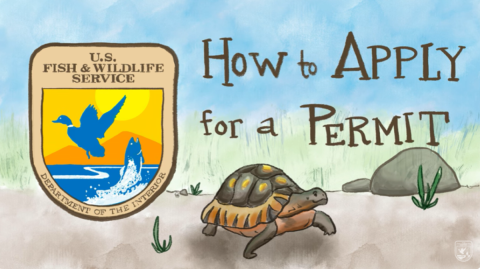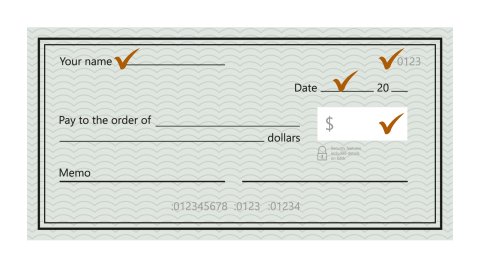Questions & Answers
Frequently Asked Questions About International Affairs' Permits
I am a new applicant. Where do I start?
We recommend that you read the information on our Do I Need A Permit? webpage and watch the video, "How to Apply for a Permit."
Where can I get help with my electronic permit application?
Helpful resources can be found at our Help Center.
What steps are involved in the permit application process?
What information will I need to complete the permit application form?
You will need to provide:
- The accurate scientific name of the genus and species, and (if applicable) the subspecies. We cannot process your application without this information.
- The specimen type or description (e.g., wood products, musical instruments, live animals, leather goods, biomedical samples, etc.).
- The proposed activity (e.g., import, export, re-export, interstate commerce, etc.).
- For U.S. residents, provide your complete physical address and mailing address.
- For non-U.S. residents, provide your current foreign address (including the country) and an address where you will be staying in the United States.
- All pertinent documents should be legible and uploaded in an appropriate file format (for most documents, this will be in PDF format).
- A valid email address that you check regularly.
- Appropriate fee payment.
What can I do to help you process my application and minimize delays?
- Submit your application a minimum of 60 to 90 days prior to the requested activity and submit it only one time.
- Complete all questions on the application. Mark questions that are not applicable with “N/A’. If needed, provide additional information in an attachment and indicate the application number that is being addressed.
- Respond promptly to our emails (check your spam folder often). You need to respond within 45 days for your application to remain active.
- Keep a copy of everything you submitted with your application for your records, including proof of payment.
How do I submit my application?
File your application electronically.
If you must apply via a paper application, you need to include a check or money order for the appropriate fee and check your email often (including your spam folder) for communications from us.
How will I know if you have received my application?
Check your email inbox or spam folder for our acknowledgement of your application. The sender will be, "ePermits Processing, FWS."
How long will it take to process my application?
- The process time varies depending on:
- The complexity of the application (this can include the total number of species and specimens).
- The wild animal or plant species and the level of protection.
- If the application is accurate and complete.
- If additional review is required from other entities.
- Allow 60 to 90 days for most CITES applications to be processed and please understand that Endangered Species Act and certain CITES applications may take longer.
- Some applications require review by multiple experts in several offices and some require publication in the Federal Register to allow for a 30-day public comment period.
Note: You can follow our Federal Registration notices by enrolling to receive notifications. To do so, go to the Federal Register, select the "MyFR" link on the right-hand side of the main navigation bar, and register for an account. Then, you'll be walked through the process to subscribe to notifications from specific agencies or on specific topics.
Can you expedite or prioritize my application?
No. We process applications in the order they are received. Please plan ahead and submit your request at your earliest opportunity.
How do I check on the status of my application?
If you submitted either a paper or an electronic application, you need to submit a program support ticket.
You will need to provide:
- The CS# (application number) you received after submitting your application.
- The date you submitted the application.
- Proof of payment:
- By check:
- Check number
- Date on the check
- Name on the account
- Amount of check
- If the check was cashed by your bank
- By money order:
- Receipt with tracking number
- By check:
Can I check on the status of someone else’s application?
Under privacy regulations, we can only release application information to the applicant or point of contact provided in the application. If you wish for someone else to communicate on your behalf, you must include a signed Power of Attorney document authorizing them to do so.
Are non-domesticated animals that are captive-born or bred, or hatched in captivity considered wildlife?
Yes. Federal law 50 CFR 14.4 defines domesticated animals. Any animal species not listed under this regulation, as well as their parts, products, eggs, and offspring, are considered wildlife.
Does every species need a permit?
No, not every species requires a permit, but clearance and inspection requirements may apply.
Before importing or exporting your shipment, we recommend you review our Do I Need A Permit? webpage.
I am moving to or leaving the United States. Are there exemptions for personal and household items?
Yes, under certain conditions.
The United States recognizes the CITES personal and household effects exemption for non-living wildlife, and their parts and products, when the import or export is part of a household move or accompanying the owner and intended for personal use (this does not include specimens mailed or shipped separately). Information concerning exemptions for personal and household items may be found at Do I Need a Permit?, on our CITES Permits and Certificates factsheet, and also under federal law 50 CFR 23.15.
However, not all countries recognize this exemption. If a foreign country requires a permit, we will honor their interpretation of the CITES treaty and process an application. Please contact the CITES office in the foreign country to determine their requirements.
I am traveling with my pet bird or other exotic pet. Do I need a permit?
Yes, and you have a few permit options including a pet passport, which is typically valid for three years, and is intended for multiple border crossings. Our Traveling Abroad with Your Pet Bird factsheet and Traveling with your Exotic Pet poster has detailed information.
If you are relocating, you need to apply for a one-time import, export, or re-export application for any CITES-listed pet, including birds, reptiles, and amphibians.
Given the high volume of applications we receive, please allow at least 60 days for us to process your application.
Do I need a permit to export ginseng for personal use in my personal luggage?
No, if the ginseng is cultivated (farmed) and if you carry the ginseng with you in your personal luggage under the personal effects exemption. (Have a copy of this regulation with you for reference purposes).
Yes, if the personal exemption criteria are not met, or if the importing country does not recognize this exemption. You will need to apply for a CITES Appendix II export permit for plants and plant products before you leave the United States.
Additionally, you should check with the CITES Management Authority of the importing country to be sure they will recognize this exemption, and consult the U.S. Department of Agriculture – APHIS, and individual states to meet their requirements.
What do I need to do to clear wildlife at U.S. Ports of Entry?
All wildlife must be imported and exported through a designated port, or as authorized by a Designated Port Exception Permit, and must be declared to and inspected by a U.S. Fish and Wildlife Service wildlife inspector. A Wildlife Declaration Form 3-177 must be filed at the time of importation or exportation. Wildlife inspectors are stationed at various Ports of Entry (Wildlife Inspection Offices) and at certain border crossings and airports. They are available to perform these inspections by appointment. Contact our Office of Law Enforcement for additional guidance.
How do I contact you if I need further assistance?
Please visit our Help Request for Program Support webpage where you can review numerous self-help options, check on the status of an application, and ask about application or permit questions.
If you still require assistance, please Contact Us or our Office of Law Enforcement.



